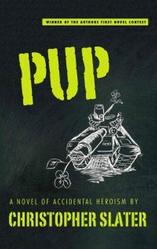 "I decided to start the imprint because I wanted to do the kind of publishing that I really believed in," said Lou Aronica, author and co-founder of the independent publishing house the Story Plant. Founded in 2008 with Peter Miller, the Story Plant specializes in fiction and commits to its authors over multiple books. Among its titles are the just-released Pup by Christopher Slater, Lavina by Mary Jacob and The Thin Black Line by Simon Gervais.
"I decided to start the imprint because I wanted to do the kind of publishing that I really believed in," said Lou Aronica, author and co-founder of the independent publishing house the Story Plant. Founded in 2008 with Peter Miller, the Story Plant specializes in fiction and commits to its authors over multiple books. Among its titles are the just-released Pup by Christopher Slater, Lavina by Mary Jacob and The Thin Black Line by Simon Gervais.
"Too much of publishing has moved to station-to-station publishing," continued Aronica, referring to publishers committing to just one book at a time. "That might work with nonfiction, but my feeling was that it wasn't the healthiest way to build novelists."

|
|
| Lou Aronica | |
The Story Plant began with two titles in 2008. In 2009, Aronica published a few more titles, and in 2010 he published five. Last year, the Story Plant published 30 titles, and Aronica expects the total for 2015 to be roughly the same, with 36 expected for 2016. The Story Plant, which is distributed by Perseus Distribution, still does an initial print run for every one of its titles but, Aronica explained, it was the addition of digital publishing to the press's efforts that allowed him to expand the list greatly over a relatively short amount of time.
"The barrier to entry got lower," said Aronica. "Digital allowed us to take more chances on a wider range of books."
The way it plays out, he added, is that Story Plant's hardcover list is "the part of the list where we're taking some really aggressive distribution positions." The paperback list is more modest, and older titles are quickly transitioned to digital editions. "It's the most prudent and cost-effective way."
The company's workflow is also entirely digital; the press has no physical offices. "I'm in Connecticut. Our associate publisher is in New Jersey," said Aronica. The Story Plant has five full-time people, and then a group of about a dozen regular freelancers who get contracted for packaging, copy editing and that sort of thing. "There's no real reason to have a physical office anymore."
Last spring, Aronica and his colleagues launched Authors First, an online educational resource for writers. All five of the Story Plant's full-time staff are writers, and combined the group has decades of experience in the publishing business. It occurred to the staff of the Story Plant that they've naturally gravitated toward working with authors who care deeply about the craft of writing itself. Before long, they realized that they had a great resource to provide to new writers.
"We could give them access to this brain trust, this group of accomplished writers who love to think about writing," Aronica said. "That sort of became the genesis of the Authors First program. We as a house of writers should be paying that forward."
As part of the Authors First program, they created a virtual writer's conference, available wherever and whenever. At launch, there was only a handful of instructional pieces, or "sessions," on the site. Now the syllabus consists of 40-plus sessions with text and video content, and this year the plan is to add one to two sessions per week to the syllabus. The sessions cover a wide range of topics, from the craft of writing to editorial and marketing issues.
"That kind of high-level advice is something that new writers can really benefit from," said Aronica. "And the perspective is always from the writer's perspective, never an academic or corporate perspective."
Everything on Authors First is free so far. Before the end of the year, Aronica and his colleagues plan to add a "master class" level to the site that will be behind a paywall. "Everything that's up now will always be free, and there will be free material in the future," Aronica stressed. So far, the exact details of that paid program have not been ironed out. "But what we feel is that there's a level of advice we can offer that really should be behind a paywall." Authors First also launched with two contests: one for fiction and another for short stories. All told, the contests drew more than 1,000 submissions, and winners were crowned last December. The winner of the novel contest, Christopher Slater's Pup, was picked up by the Story Plant and went on sale on June 16.
Authors First also launched with two contests: one for fiction and another for short stories. All told, the contests drew more than 1,000 submissions, and winners were crowned last December. The winner of the novel contest, Christopher Slater's Pup, was picked up by the Story Plant and went on sale on June 16.
"My hope [with the contest] was that we'd find a pretty good genre book," recalled Aronica. "That would have been a win. But instead we found a really, really fine piece of work that I think will be around for a while."
The Story Plant also signed one of the contest's runners-up to a three-book deal, and the 17 winning short story submissions will be published next month in an anthology called Portable Magic. Story Plant's second pair of contests also just went live, and the site will be accepting submissions until the end of September. The plan is to do a novel and a short story contest every year, but if they're all as successful as the first, Aronica might expand the contests to focus on specific areas, such as fiction by women or fantasy or science fiction. So far, though, the contests aren't qualified in any way other than length.
"The whole idea behind it was sort of to give authors a place where somebody would take them seriously, to give them a fair reading," Aronica said. "We'd hoped to get something out of it, but it turned out way better than I thought. Now I'm expecting a book as good as Pup." --Alex Mutter

